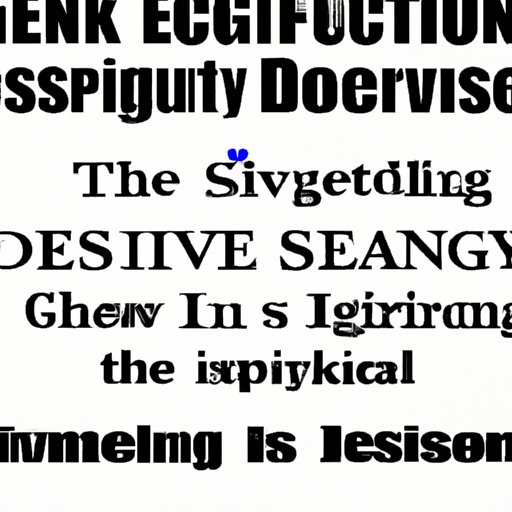Introduction
Intelligent design (ID) is a controversial concept that has been debated in the scientific community for decades. ID is a religious belief that posits that certain features of the universe and living things are best explained by an intelligent “designer” rather than by natural selection or other processes of evolution. Proponents of intelligent design argue that it provides an alternative explanation to evolutionary theory, while opponents contend that there is no scientific evidence to support the notion of an intelligent designer.

Examining the Evidence for Intelligent Design Theory
Proponents of intelligent design claim that certain features of the universe, such as the complexity of certain organisms, cannot be explained by natural selection alone. They argue that if one looks at the world around them, there is evidence of design in nature, which implies that a higher power or intelligence must have created it. Advocates of ID point to the complexity of the human eye, for example, as evidence that it could not have evolved naturally, but must have been designed by an intelligent being.
In order to analyze the claims of intelligent design proponents, scientists have conducted extensive research into the evidence for ID. Studies have shown that although some features of the universe appear to be designed, they are in fact the result of natural processes. For example, studies have found that the human eye is not as complex as originally thought, and that its structure can be explained by natural selection.
In addition, researchers have examined the claims that certain features of the universe are too complex to have evolved naturally. They have concluded that, while some features may be complex, they are still explainable through natural processes. For instance, researchers have studied the genetic code of certain organisms and determined that they could not have been created by an intelligent designer, but were instead the result of natural selection.
Exploring the Controversy Around Intelligent Design
The debate surrounding intelligent design has become increasingly contentious in recent years. On one side, proponents of ID argue that the existence of an intelligent designer should be taken seriously and given consideration in science and education. On the other side, critics of ID contend that there is no scientific evidence to support the notion of an intelligent designer and that teaching ID as an alternative to evolutionary theory would undermine the credibility of science.
To investigate the role of intelligent design in the creationism debate, scientists have examined the arguments put forward by ID proponents. They have concluded that while certain features of the universe may appear to be designed, they can be explained by natural processes. Additionally, researchers have evaluated the claims of intelligent design advocates and found that they lack empirical evidence and rely heavily on faith-based explanations.
Furthermore, scientists have assessed the potential impact of intelligent design on science and education. They have determined that teaching ID as an alternative to evolutionary theory would create confusion among students and lead to a misunderstanding of basic scientific concepts. In addition, introducing ID into the classroom would trivialize the real scientific theories that are backed by evidence.

Comparing Intelligent Design to Evolutionary Theory
In order to better understand the debate around intelligent design, it is important to compare it to evolutionary theory. Evolutionary theory is based on the idea that all life forms have evolved over time from simpler forms. It proposes that species change over time due to natural selection and other processes. Proponents of evolutionary theory argue that the evidence for it is overwhelming, and that it provides a comprehensive explanation for the diversity of life.
In contrast, intelligent design does not provide a comprehensive explanation for the diversity of life. Instead, it suggests that certain features of the universe are best explained by an intelligent designer, which cannot be confirmed through scientific observation or experimentation. Additionally, ID does not provide any mechanism for how this designer created the universe, and relies heavily on faith-based explanations.
When comparing the two theories, it is important to assess their strengths and weaknesses. Evolutionary theory is backed by extensive scientific evidence and provides a comprehensive explanation for the diversity of life. In contrast, intelligent design lacks empirical evidence and relies heavily on faith-based explanations. As a result, evolutionary theory remains the most widely accepted scientific explanation for the origin of life.
Conclusion
The debate around intelligent design has been ongoing for many years, with proponents arguing that it provides an alternative explanation to evolutionary theory. However, after examining the evidence, scientists have concluded that there is no scientific basis for intelligent design and that it relies heavily on faith-based explanations. Additionally, introducing ID into the classroom would create confusion among students and lead to a misunderstanding of basic scientific concepts. Ultimately, evolutionary theory remains the most widely accepted scientific explanation for the diversity of life.
In conclusion, the scientific evidence supports evolutionary theory over intelligent design. While proponents of ID may continue to argue for its validity, it is clear that there is no scientific basis for their claims. Therefore, it is recommended that further research be conducted into the validity of intelligent design and its implications for science and education.
(Note: Is this article not meeting your expectations? Do you have knowledge or insights to share? Unlock new opportunities and expand your reach by joining our authors team. Click Registration to join us and share your expertise with our readers.)
